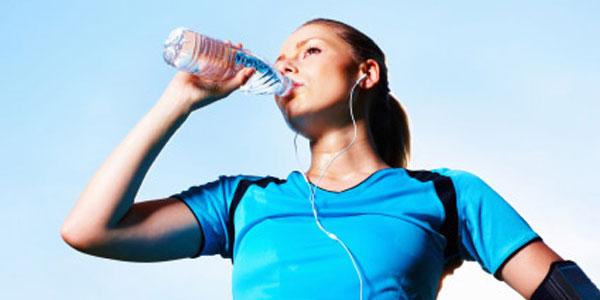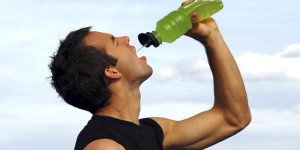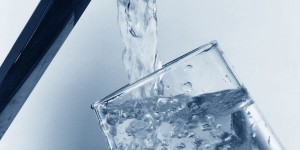Hydration and Exercise – Debunking the myths
Note: If you are viewing exercise videos on a mobile device, please switch to horizontal view for the best experience.
Keeping yourself hydrated is the single most important element of a good workout regime. A person can lose up to a litre of fluid during an hour’s exercising. This, of course, varies from person to person.
The sweat and the air a person breathe out all contains these fluids, and if an individual keeps working out and does not rehydrate they will begin to suffer from dehydration. This can affect your ability to workout and more importantly it can have a negative impact on your health. Therefore, it is incredibly important to make sure the right amount of fluid intake occurs before, during and after exercise.
Remember an individual does not have to drink a litre of water a day whilst exercising! This has been debunked by scientists. In fact, over hydration can have just as much of a negative effect on the body as dehydration.
So to start off with, you need to think about what you are drinking – for example; three cups of coffee are made up of 98% water. Therefore, you need to think about what you drink, day-in and day-out, to better inform and educate your hydration plan. If you’re drinking three cups of coffee a day, you’re not going to need to drink a later of water alongside that.
What the Experts say?
The American College of Sports Medicine, along with the British Medical Council, agree “adequate fluid replacement helps maintain hydration, and, therefore, promotes the health, safety and optimal physical performance of individuals participating in regular physical activity” (Convertino et al, 1996).
It is vitally important to develop individual ‘hydration strategies’ for athletic, sporting or recreational activities. Some sport scientists argue “athletes [of all ages and abilities] are encouraged to begin exercise well hydrated and to consumer sufficient amounts of fluids during exercise to limit water and salt deficits. [As] available evidence suggests that many athletes begin exercise dehydrated to some degree, and although most fail to drink enough to match sweat loss” (Maughan et al, 2008).
Create a ‘Hydration Strategy’
The development of a ‘hydration strategy’ will better help athletes to “assess their hydration status and develop a personalized hydration strategy that takes account of exercise, environment and individual needs” (Maughan et al, 2008).
Preparedness is a fundamental requirement of making sure an individuals exercise is closely followed by a good hydration intake. Therefore, plan ahead. If you know you’re going to go for a cross-country run, do a short 30 min jog or undertake a marathon then prepare your hydration strategy beforehand to better tailor your needs. This can be a pint or two of water beforehand, followed by a squeezy bottle during the run (or for short exercises it could be kept back at home or in the car).
Once you finish, you drink a print or two of water to rehydrate. Remember you need to think sweat, as you need to replace that water. If you’re covered in sweat, after a 1hr 30min run, then you might need to take on more water to rehydrate.
You don’t need to drink a litre of water before every workout of course, you just need to think proactively about the workout you are about to undertake and from that, identify what you need to drink. The shorter and less strenuous the workout, the less water you will need. Inversely, the longer and harder the workout, the more water you will need to replace. Think about what you want out of your workout in terms of hydration.
What to drink?
The ‘litre a day’ adage comes from the scientific research on weight-loss during exercise. During a 1hr strenuous exercise, an adult would lose 1.5 litres of body fluid for every kilogram of body weight lost.
This became folklore whereby you had to drink 1 litre plus a day. This is wrong because if you down a bottle of Evian or Volvic plus your regular intake of water (in foods, tea or coffee) you might overhydrate – so think about your intake.
Also, avoid sugary drinks and shun caffeine drinks like red bull if possible. You need a drink with the right balance. Water is the best advice given by scientists (Candas et al, 1986). However, engineered sports drinks, like Lucozade or Gatorade, are full of minerals, salt and vitamins and are also predominantly 80%-plus water-based. As such, these drinks offer a wider ‘all-round’ rehydration solution.
However, rehydration sachets are available online or in stores. You add this to the water and this adds the right balance of salt, vitamins and minerals. If you cannot afford such drinks or sachets don’t worry as water is always going to be the best (and most low cost) fluid you can use to rehydrate.
What Should You Do?
Remember that if you keep yourself hydrated, drink enough fluids during the day, and rest between 8 and 12 hours between workouts then your body will be able to handle any workout.
You don’t need to do anything ‘extra’ in terms of hydration. If you continuously drink a small amount of fluid every hour your body will then keep fully hydrated for longer. The best way to check, according to NHS/BUPA, is to look at your urine colour. Your urine should be pale yellowy colour – the darker it is the more dehydrated you are.
Therefore, by looking at your urine – as a marker, along with continuous short intakes of fluid and breaks between workouts, your body should be fully adjusted and ready to workout without suffering from dehydration and follow-on fatigue. Drink water – of sports speciality drinks – and look at your urine along with planning your hydration intake around your workout plan. This will help you get the most out of your workout.
What Else You Need To Know
If possible, you should always drink water over any other type of drink. Yes, there are a lot of sports drinks out there these days and some of the TV adverts even claim that they rehydrate you better than water does but think about it, how can this be possible?
Obviously, they might provide vitamins and minerals that water doesn’t hold but in terms of hydration, water is the best. Plus, if you have a healthy diet, you will be able to obtain any vitamins, minerals, protein and energy from your food rather than an energy drink that has likely been stufffed with preservatives and E-numbers.
As well as this, you should keep in mind that keeping hydrated is paramount for anyone, even if you’re not doing exercise. This means that if you’re just hanging out at home or in the sauna down the gym, you need to stay hydrated. It’s said that even a small drop in the level of hydration will significantly reduce concentration levels so therefore, if you’re working, staying hydrated will be particularly important if you want to stay productive.
Conclusion
Undertaking good hydration planning will result in a more robust exercise experience. This experience will achieve better results as the body will be fully hydrated.
This level of hydration, along with the pre-requisite of a healthy diet and proportional workout regime, will mean your body will retain the right nutrients, minerals and vitamins and your body will be healthier. As such, this will better help you achieve your athletic and sporting goals.
So, as you plan your workout regime (whether it be either cardio based or weight training), you should plan your hydration simultaneously. This way you can avoid the problems and workout fatigue of dehydration and also you can avoid over hydration issues. If you do this, your body will be fully active and aware of its possibilities and this, in return, will mean you will get the maximum result from your workout endeavours.




